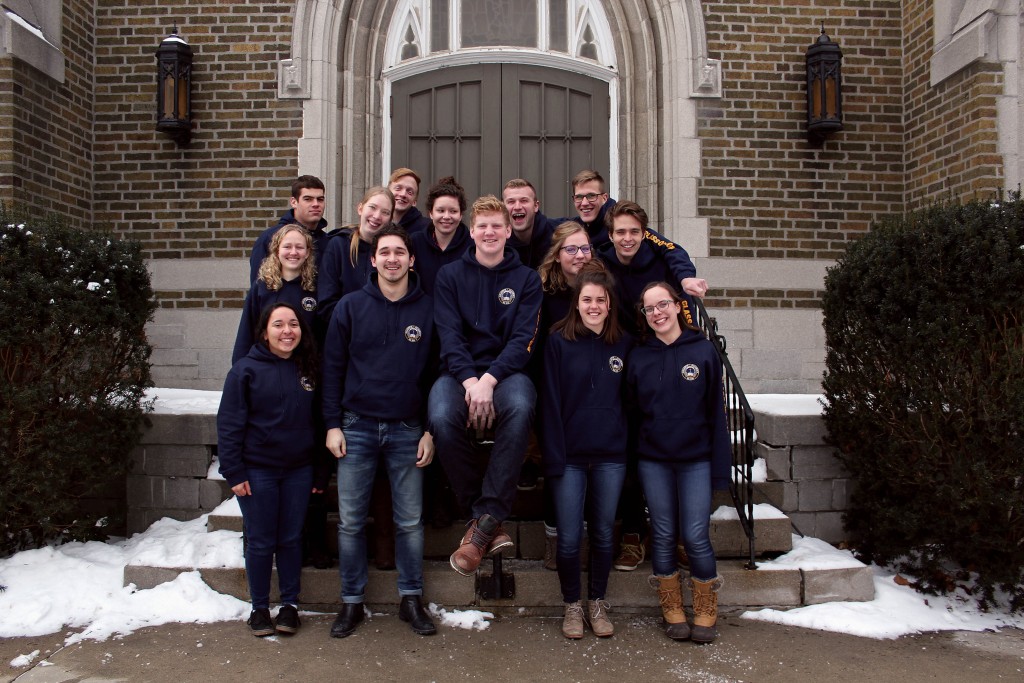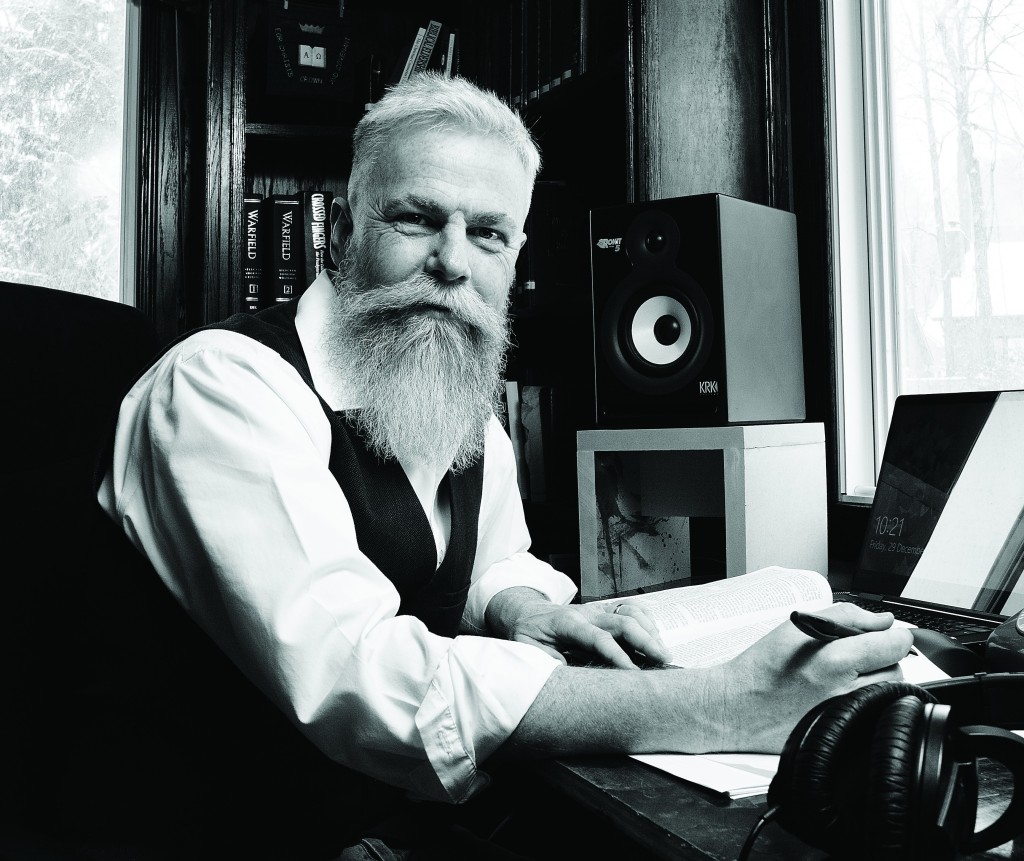You have free articles remaining this month.
Subscribe to the RP Witness for full access to new articles and the complete archives.
On most weekdays during the school year, a group of older teens makes the Christian education wing of Grace Presbyterian Church in Woodstock, Ont., a busy place. For four to five hours, Tuesday through Friday, the largest classroom serves as the lecture hall for Gillespie Academy. In this hall, lectures on Scripture, theology, philosophy, apologetics, ethics, and logic challenge the students to think about all of life from a decidedly Christian and Reformed perspective.
Gillespie Academy is a one-year postsecondary program designed to prepare students for college, future employment, or the building of a Christian home. Grounded in the Reformed Christian faith and the Westminster Confession and Catechisms, the courses provide essential tools to meet the practical and philosophical challenges of secular university and adult life. The courses are designed so that students will gain skills in research, communication, and critical thinking, as well as grow in their understanding and ability to proclaim and defend the Christian faith.
What makes Gillespie Academy distinct from other foundational study programs in Canada is its emphasis on a biblical understanding of the nature and purpose of education itself. Rather than adopting the secular view, which maintains that education is a means for obtaining a better career with higher earning potential, Gillespie Academy views the goal of education as the knowledge of God. “If you want to learn to know and treasure God’s Word more,” a student said, “wrestle through its application to all of life, and abound in a life of service for Christ and His Kingdom, Gillespie is the place to go.” Our prayer is that students will learn to see that from the one true and living God comes the diversity of the created universe. This diversity, rightly understood, points back to the One who created it.
For a decade or more, a group of pastors and educators discussed the need for such an educational undertaking in Canada. This group was anxious that our young people be properly prepared for the challenges that secular university, and society in general, presented to Christian young people. But for many years it remained an elusive idea because of a lack of time, finances, and leadership.
In 2008, Rev. Brian Murray, an Associate Reformed Presbyterian minister, moved to Woodstock with his family. Brian was working toward his Th.M. degree from Puritan Theological Seminary in Grand Rapids, Mich. As they settled themselves into the congregation of Grace, Brian helped with some teaching in various settings within the congregation. His teaching gifts were immediately apparent to the leadership of the congregation, and we began thinking that perhaps here was the solution to the question we had been mulling over for years.
Eventually the session approached Rev. Murray with what we had envisioned, offering to hire him for a year to put together a proposal for a two-semester, postsecondary program of biblical and theological education. At this point we also began to draw in area pastors interested in what we were proposing. Pastor Scott Wilkinson of New Creation, Kitchener, Ont., RPC was one of those who enthusiastically joined us in the discussions and planning.
Over the next months, the outlines for the yet-unnamed program were laid down and fleshed out. Meeting monthly, we began to see a course of study take shape that would ground our students in a clearly confessional understanding of the Christian life and its relation to the world in which they lived. The problem began to be not so much what we would teach but what we would leave out!
Oddly enough, one of the most challenging questions was what to call this program. We were not pretending to be a college or a university, and “school” seemed somehow inadequate. Eventually the historical associations with “academy” persuaded us to use that term. But what name to tie to it remained up in the air.
After reading of the history of the Westminster Assembly, one of us suggested the name of George Gillespie. Alexander Whyte writes of him: “Rev. George Gillespie was one of that remarkable band of statesmanlike ministers that God gave to Scotland in the seventeenth century. Gillespie died while yet a young man, but before he died, as Rutherford wrote to him on his deathbed, he had done more work for his Master than many a hundred grey-headed and godly ministers.” Gillespie was “one of the four famous deputies who were sent up from the Church of Scotland to sit and represent her in the Westminster Assembly in 1643. Gillespie’s great ability was well known, his wide learning and his remarkable controversial powers had been already well proved, else such a young man would never have been sent on such a mission; but his appearance in the debates at Westminster astonished those who knew him best, and won for him a name second to none of the oldest and ablest statesmen and scholars who sat in that famous house.” (Alexander Whyte, Samuel Rutherford and Some of His Correspondents: Lectures Delivered in St George’s Free Church, Edinburgh)
Gillespie was unusual in both gifts and grace; he was the sort of young man that we wanted our students to emulate. Our desire was that the year of preparation would send them into their respective fields equipped to be used by the Lord to change the church and the culture.
In the winter of that year of planning and preparation, the congregation of Grace extended a call to Rev. Murray to be one of the pastors of our congregation whose chief duty would be to teach and administer the workings of Gillespie Academy. Brian also preaches at Grace about one Sunday per month, teaches a monthly book study and an adult Westminster Confession class, and does some pastoral counseling. His prime focus, though, is the work of Gillespie Academy.
The presbytery installed Rev. Murray in spring 2010, and classes began in September. Our first class had five students: two from Grace and three from Free Reformed Churches in the area. Pastor Murray, Dr. Benjamin Short of the Orthodox Christian Reformed Church, Pastor Scott Wilkinson, and I taught that year, along with Mrs. Jo Wright, who tutored in English. This teaching staff has continued working together and growing in our understanding of our mission. Dr. Short and Pastor Wilkinson receive a small travel allowance that covers expenses, but they graciously volunteer many hours over a school year to help Gillespie Academy function.
Now in our eighth year, we have had the pleasure of having students from Nova Scotia, New Brunswick, British Columbia, Washington state, Maryland, Georgia, Michigan, and from all over Ontario. We have even had one young man from South Korea! Most of our students come from NAPARC-affiliated congregations, including the RPCNA. However, we have had students from broader Reformed denominations, baptistic, and even charismatic congregations study with us. The majority of our students come from a homeschooling background, but others come from the public school system, Roman Catholic schools, and Christian schools. A couple college grads have even come.
In order to maintain a manageable workload for our volunteer teachers, and to have a classroom dynamic that fosters the kind of discussions we want to see students engaged in, we have deliberately limited enrollment to 20 students. We happily violated that policy once to accommodate our South Korean brother.
With the cap set at 20 the opening of registration on Jan. 1 brings a flood of applications for our administrator, Mrs. Kristen Rood, to sort through. The session of Grace acts as the board of the school, and the elders review the applications. They make the final decisions on admissions.
Our graduates have gone from Gillespie to colleges and universities across North America. Others are serving with mission organizations in Central America and Africa, and still others have gone straight into the work force. Several Christian universities give credit for some of our courses. One secular provincial college gave credit for two of our courses.
Since the successful completion of that first year in spring 2011, we have been repeatedly approached to consider applying our philosophy and methodology to the pastoral training of men for service in Canada. We steadfastly resisted. That is, until Pastor Rich Ganz of the Ottawa, Ont., RPC contacted me in fall 2017 to discuss how we could coordinate the work of the Ottawa Theological Hall (OTH) with a similar work in southern Ontario. Next steps are in progress. Speaking with pastors Scott Wilkinson, Matt Kingswood, and Vince Ward, we have begun working toward a cooperation with OTH that would train pastors at Grace.
The Lord has blessed Gillespie Academy far beyond anything we could have imagined when we stepped out in faith in September 2010. Where the next steps will all lead only the Lord knows, but we trust it will be for the further blessing of the ARP Church, the RPCNA, and other Reformed denominations in Canada. Please pray for us and for the young people the Lord has entrusted to our care.
Jeff Kingswood is one of the pastors of Grace ARP in Woodstock, Ont., and teaches logic, rhetoric, and New Testament at Gillespie Academy.

